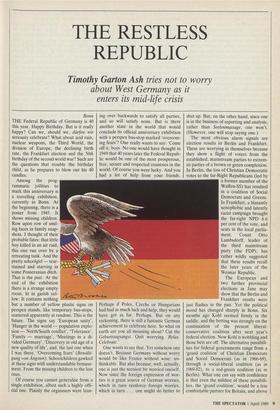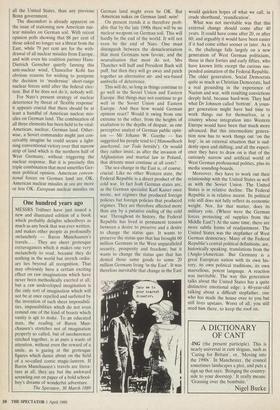THE RESTLESS REPUBLIC
Timothy Garton Ash tries not to worry
about West Germany as it enters its mid-life crisis
Bonn THE Federal Republic of Germany is 40 this year. Happy Birthday. But is it really happy? Can we, should we, durfen wir seriously celebrate? What about acid rain, nuclear weapons, the Third World, the division of Europe, the declining birth rate, the Frankfurt election and the 50th birthday of the second world war? Such are the questions that trouble the birthday child, as he prepares to blow out his 40 candles.
Of course you cannot generalise from a single exhibition, albeit such a highly offi- cial one. Plainly the organisers were lean- ing over backwards to satisfy all parties, and so will satisfy none. But is there another state in the world that would conclude its official anniversary exhibition with a perspex bus-stop marked 'overcom- ing fears'? One really wants to say: 'Come off it, boys. No one would have thought in 1949 that 40 years later the Federal Repub- lic would be one of the most prosperous, free, secure and respected countries in the world. Of course you were lucky. And you had a lot of help from your friends.
Perhaps if Poles, Czechs or Hungarians had had as much luck and help, they would have got as far. Perhaps. But on any reckoning, there is still a fantastic German achievement to celebrate here. So what on earth are you all moaning about? Cut the Geburtstagsangst. Quit worrying. Relax. Celebrate.'
One wants to say that. Yet somehow one doesn't. Because Germany without worry would be like France without wine: un- thinkable. But also because, well, actually, one is just the teeniest bit worried oneself. Now since the foreign expression of wor- ries is a great source of German worries, which in turn reinforce foreign worries, which in turn . . . one might do better to
shut up. But, on the other hand, since one is in the business of reporting and analysis, rather than Seelenmassage, one won't. (However, one will stop saying one.) The European and two further provincial elections in June may show that the Berlin and Frankfurt results were just flashes in the pan. Yet the political mood has changed sharply in Bonn. Six months ago Kohl seemed firmly in the saddle, and the betting was strongly on the continuation of the present liberal- conservative coalition after next year's federal election. Now Kohl is wobbling and those bets are off. The alternative possibili- ties for federal governments range from a 'grand coalition' of Christian Democrats and Social Democrats (as in 1966-69), through a social-liberal coalition (as in 1969-82), to a red-green coalition (as in Berlin). What one can say with confidence is that even the mildest of these possibili- ties, the 'grand coalition', would be a less comfortable partner for Britain, and above
all the United States, than any previous Bonn government.
The discomfort is already apparent on the issue of stationing new American nuc- lear missiles on German soil. With recent opinion polls showing that 88 per cent of those asked no longer see a threat from the East, while 79 per cent are for the with- drawal of all nuclear missiles from Europe, and with even his coalition partner Hans- Dietrich Genscher quietly fanning this anti-nuclear wind, Chancellor Kohl has obvious reasons for wishing to postpone the decision to 'modernise' short-range nuclear forces until after the federal elec- tion. But if he does not do it, nobody will.
For Nato's present strategy of nuclear deterrence by threat of 'flexible response' it appears crucial that there should be at least a handful of American nuclear mis- siles on German land. The combination of all three elements has been held to be vital: American, nuclear, German land. Other- wise, a Soviet commander might just con- ceivably imagine he could secure a light- ning conventional victory over that narrow strip of land which is the northern half of West Germany, without triggering the nuclear response. But it is precisely this triple combination that most unsettles Ger- man political opinion. American conven- tional forces on German land are OK. American nuclear missiles at sea are more or less OK. European nuclear missiles on
German land might even be OK. But American nukes on German land: nein!
On present trends it is therefore prob- able that by the late 1990s there will be no nuclear weapons on German soil. This will hardly be the end of the world. It will not even be the end of Nato. One must distinguish between the denuclearisation that most Germans now favour, and the neutralisation that most do not. Mrs Thatcher will huff and President Bush will puff, but then they will go away and patch together an alternative air- and sea-based umbrella of deterrence.
This will do, so long as things continue to go well in the Soviet Union and Eastern Europe. But things may not continue to go well in the Soviet Union and Eastern Europe. And then how would German opinion react? Would it swing from one extreme to the other, from the heights of exaltation to the depths of despair, as one perceptive analyst of German public opin- ion — Mr Johann W. Goethe — has suggested his people tend to (Wimmelhoch jauchzend, zur Tode betrilbt). Or would they rather insist, as after the invasion of Afghanistan and martial law in Poland, that detente must continue at all costs?
The sea-change in the East is, of course, crucial. Like no other Western state, the Federal Republic is a direct product of the cold war. In fact both German states are, as the German specialist Karl Kaiser once wrote, not regimes that produced foreign policies but foreign policies that produced regimes. They are therefore affected more than any by a putative ending of the cold war. Throughout its history, the Federal Republic has lived in permanent tension between a desire to preserve and a desire to change the status quo. It wants to preserve the status quo that has brought 60 million Germans in the West unparalleled security, prosperity and freedom; but it wants to change the status quo that has denied those same goods to some 20 million Germans living In the East'. It was therefore inevitable that change in the East would quicken hopes of what we call, in crude shorthand, 'reunification'.
What was not inevitable was that this external change should come after 40 years. It could have come after 20, or after 60; and arguably it would have been easier if it had come either sooner or later. As it is, the challenge falls largely on a new generation of West German politicians, those in their forties and early fifties, who have known little except the curious sus- pended animation of the Federal Republic. The older generation, Social Democrats quite as much as Christian Democrats, had a real grounding in the experience of Nazism and war, with resulting convictions deeply held, because hard-won. They had what Dr Johnson called 'bottom'. A youn- ger generation might have had time to work things out for themselves, in a country whose integration into Western Europe would have been that much more advanced. But this intermediate genera- tion now has to work things out 'on the hop', in an external situation that is sud- denly open and shifting, and all the experi- ence they have to draw on is that of the curiously narrow and artificial world of West German professional politics, plus its media sounding-boards.
Moreover, they have to work out their relationship with the United States as well as with the Soviet Union. The United States is in relative decline. The Federal Republic is in relative ascent. Its political role still does not fully reflect its economic weight. Nor, for that matter, does its military role. (Where were the German forces protecting oil supplies from the Middle East?) At the same time, there are more subtle forms of readjustment. The United States was the stepfather of West German democracy. Many of the Federal Republic's central political definitions, are, historically speaking, translations from the (Anglo-)American. But Germany is a great European nation with its own his- tory, its own political traditions, its own marvellous, potent language. A reaction was inevitable. The way this generation talks about the United States has a quite distinctive emotional edge: a 40-year-old talking about a difficult stepfather, one who has made the house over to you but still lives upstairs. Worst of all, you still need him there, to keep the roof on.



















































 Previous page
Previous page